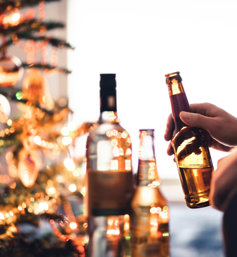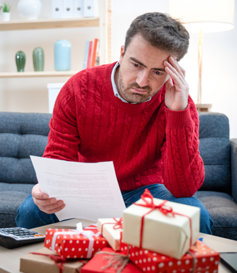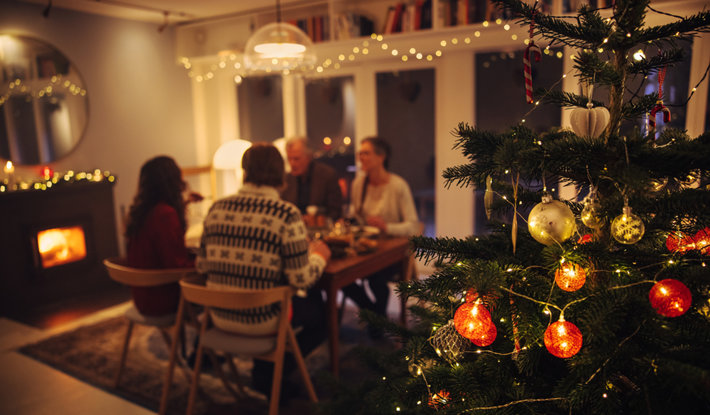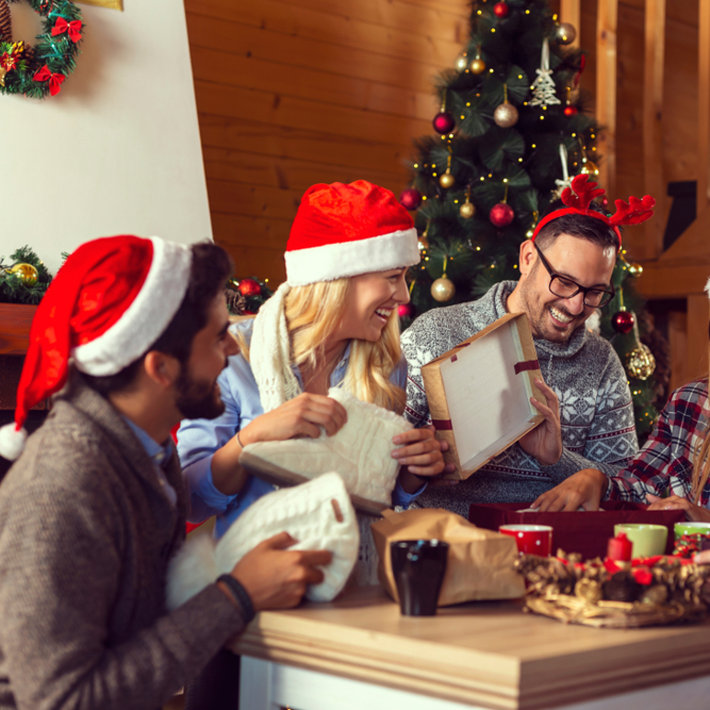Staying Clean and Preventing Relapse During the Holidays

For most, the holiday season brings joy, good feelings, cherished moments with family, special celebrations, religious ceremonies, local traditions, and typically happy, positive experiences. However, some aspects of the holidays can be stressful, draining, cumbersome, unpleasant, harsh, and even bitter. For example, the holiday season is the time of year when recovering addicts are most at risk for a relapse.
What the Data Shows
Data suggests Americans who are in recovery from drug and alcohol addiction are more likely to relapse and return to drinking or drug use during the holidays. According to one source, drug and alcohol relapse rates spike at least 150% during the holidays, but even that is likely an underestimate.

The 150% figure is determined by measuring how many recovering addicts (people who have gotten addiction treatment before) seek treatment again in any given month. According to one body of research, it was during the holiday season that 60% of people who had gotten help at some point in the past then relapsed and had to seek help again. Compare that to just 25% of formerly treated individuals relapsing and then seeking help in other months of the year.
In simple terms? People are relapsing during the holidays at more than double their usual rate. Further, it’s worth noting that the existing data only shows a spike in formerly treated individuals who relapse and then seek treatment again. The total rate of relapse during the holidays would likely be much higher if the research factored in those who relapse during this time but who do not then seek help.
Common Risk Factors During the Holidays
Everyone’s experience during the holidays is different, but some of the common factors recovering addicts may face include:
- Interpersonal conflicts. People spend more time with family members, loved ones, and friends during the holidays. While most of these experiences are heartwarming and positive, extended time with family and friends also puts one at risk for conflicts, making old resentments more likely to resurface. The anger and frustration that may develop from such conflicts could push one over the edge and precipitate a relapse.

- Financial strain. People spend more money than usual during the holidays due to added expenses like gifts, groceries, travel, decorations, accommodations, eating out, and special activities. The added financial strain, coupled with an already busy time of year, may lead one to relapse.
- Holiday triggers. People in recovery have worked very hard to get to a place of sobriety. They likely had to remove people, places, activities, groups, and routines from their lives to do that. As a result, they almost certainly will not have the same friends and family group that they used to. The holidays may bring back memories of those people, places, and things, which could be enough to trigger a relapse.
- The stress of the season. Stress levels and relapse risk go hand-in-hand. It may seem difficult to quantify, but the National Institute on Drugs Abuse (NIDA) lists stress as being one of the most significant factors in a relapse. “For those that are struggling with substance use disorders, who are in recovery, be very aware that these are periods of great risk,” says Dr. Nora Volkow, Director of NIDA. “Because one of the factors that lead to drug-taking and the escalation of drug-taking, and to relapse, is stress.” Experiencing higher stress levels due to the holidays could be enough to trigger a relapse.
Staying Clean During the Holidays and Beyond
NIDA estimates about 40% to 60% of recovering addicts will relapse at some point, with the holidays being the most likely time of year that such relapses will occur. Thankfully, there are strategies that those in recovery can employ to build strength and stability in their sobriety during the holidays.
Focus on oneself. The holidays are often a time of year when one feels they must tend to the needs of others. However, for those in recovery, their sobriety is their most important commodity, and they must not risk losing it. Being available for others and contributing to the needs of family and friends is important during the holidays, but those in recovery should not overextend themselves in a way that puts their sobriety at risk.

Cut others slack. It’s not uncommon for family members and loved ones to hold onto some resentment for someone in recovery, for things that person did when they were using drugs or alcohol. A recovering addict should prepare for this, and they should cut their loved ones slack during the holidays. What others think of someone in recovery does not matter, but holding onto sobriety and not letting the criticisms bite too deeply does.
Engage in sober-friendly activities. The holidays are best enjoyed when a recovering addict can engage in activities that are sober-friendly. Ice skating, sledding, Christmas light-viewing, giving and receiving gifts, singing carols, watching holiday-themed movies, all of these and more can be done without alcohol or other mind-altering substances present.
Always use the buddy system. Part of making it through the holidays while staying sober comes down to having backup plans for what to do when tensions run high and one feels they are nearing a relapse. One such backup plan could be as simple as always having a “sobriety buddy,” i.e., someone to help hold the recovering addict accountable to their sobriety throughout the holiday season. When going to office parties, family gatherings, and other holiday celebrations, having someone there with the recovering addict who shares the recovering addict’s mission of staying sober can make a big difference in preventing relapse.
In the Event of a Relapse, Treatment is Necessary
“One of the best things a person going through recovery can have is a support system,” says Nick Sharp, a recovering addict from Bay City, Michigan. “I have a very strong group of friends and family that have supported me all the way, and it helps to know that those people are there to help get you through rough times like the holidays.” To Sharp’s point, there are many ways to prevent a relapse during the holidays.
However, should one’s plans and strategies fail, should a relapse occur, the individual, their family members and loved ones should recognize that a relapse is not the end of the world. Instead, a relapse means the individual must seek treatment again and work hard to address the underlying issues that led them to relapse.
If you know someone who relapses and returns to drinking or using drugs during the holidays, please do everything you can to get that individual help. Please do not wait until the relapse escalates and it becomes too late to help them.
Sources:
- CPRN. “Drug and Alcohol Relapse Rates Spike 150% during the Holidays.” Cision PR Newswire, 2018. prnewswire.com
- NIDA. “Coping with Substance Use Disorder during the Holidays.” National Institute on Drug Abuse, 2020. nida.nih.gov
- NIDA. “Treatment and Recovery.” National Institute on Drug Abuse, 2020. nida.nih.gov
- 12News. “Drug and alcohol relapse rates spike 150% during the holidays.” 12 News, 2022. abc12.com


 ®
®